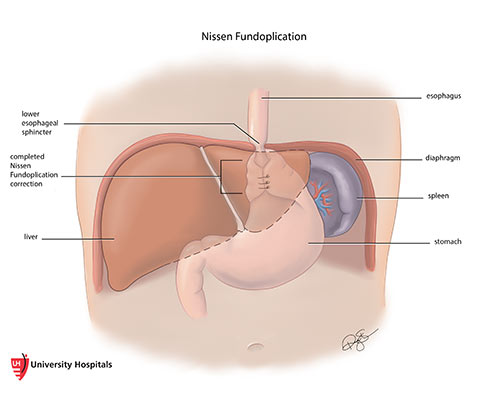Advanced Treatment for a Wide Range of Esophageal Disorders & Diseases
The digestive health specialists at University Hospitals Digestive Health Institute have extensive experience in treating a full spectrum of esophageal conditions and diseases.
Search for conditions or treatments below or browse our A-Z listing.
Our team of gastroenterologists, surgeons, interventional radiologists and other clinical staff uses state-of-the-art diagnostic techniques and the most advanced treatment options to treat the following conditions:
- Achalasia
- Barrett’s esophagus
- Esophageal cancer
- Eosinophilic esophagitis (EOE) & other inflammatory conditions
- Esophageal dysmotility
- Gastroesophageal reflux disease (GERD)
- Esophageal ulcer
- Esophageal strictures
- Heartburn
- Hiatal hernia
- Swallowing disorders
Expert Diagnosis and Treatment for Esophageal Conditions
The digestive health experts at University Hospitals offer patients a wide array of diagnostic and treatment options for esophageal conditions, including:
Endoscopy, Endoscopic Ultrasound & Biopsy. Our experts use minimally invasive techniques to sample tissue in the esophagus to assist in making a diagnosis. Endoscopic Function tests including esophageal manometry may be used to measure and evaluate muscle strength and contractions in the esophagus. Abnormalities, particularly in the lower esophageal sphincter, can contribute to symptoms such as pain, heartburn and difficulty swallowing.
ESOCheck. A new and completely noninvasive way to collect esophageal tissue samples for diagnostic testing. For this five-minute office procedure, patients simply swallow a pill-sized capsule that is attached to a thin silicone catheter. Once in the stomach, the physician inflates a special balloon inside of the capsule and then slowly withdraws it. As the balloon moves back up through the esophagus, its textured surface collects cells which can then be tested in the laboratory. ESOCheck provides a safe alternative to endoscopy for patients with risk factors for GERD and other esophageal diseases, including Barrett’s Esophagus.
Imaging tests. Often, imaging tests such as ultrasound or X-ray will be used to help identify structural and functional problems in the esophagus.
Laboratory tests. Your doctor may order blood tests to assist them in making an accurate diagnosis.
Medications. There are a variety of medications that may be prescribed to treat your esophageal condition or disease.
Minimally invasive surgical procedures for the treatment of GERD and hernias, including:
- Fundoplication: this laparoscopic procedure restores the function of the lower esophageal sphincter by wrapping the stomach around the esophagus and often combined with hiatal hernia repair. There are different fundoplications offered based on the strength of the esophageal body. The options are a complete fundoplication, also called a Nissen or a partial fundoplication, also called a Toupet fundoplication.
- Linx procedure: Some patients are candidates for a newer device which provides magnetic sphincter augmentation. The device, called a Linx, is a surgically implanted ring of magnets placed around the lower end of the esophagus.
Your health is important. Get expert care.
To schedule an in-person or virtual consultation with a UH digestive health specialist, call 1-866-UH4-CARE.



